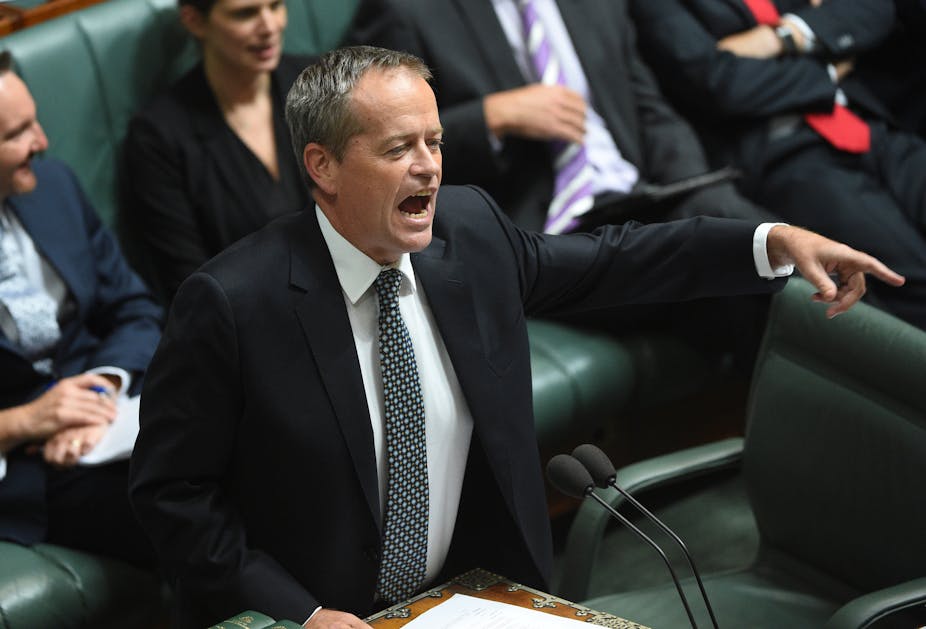The Labor Party has taken the potentially risky strategy of announcing a range of major policies well in advance of the election.
Opposition Leader Bill Shorten has taken a risk by announcing a range of policies well before the official election campaign. In recent weeks, Labor has released policies on education, industrial relations and housing affordability that contrast with those of the government.
With risk, however, may come reward.
In political campaigns, presenting as a small target is often seen to be a less risky strategy than opening up potentially controversial debates. Discussion of policy is kept vague and limited in detail in order to avoid alienating sections of the electorate who may be concerned by mooted changes.
Policies are also released much closer to the election – if at all – to avoid scrutiny.
Strategies in Australia since 1996
Over the last two decades, the results of presenting as a small target have been mixed.
John Howard used the strategy effectively in 1996. With the campaign slogan “For All of Us”, the Coalition capitalised on the electorate’s dislike for the Keating-led Labor Party to win in a landslide.
Labor sought to use the strategy throughout the 1990s and 2000s without much luck.
Kim Beazley led Labor to two election losses by appearing to be timid and guarded on policy matters. In 2001, Beazley’s approach was to support the Howard government’s policies on national security and thereby made itself almost irrelevant in the political debate.
In an attempt to present Labor as a party of ideas, Mark Latham’s leadership sought to avoid the small target strategy of his predecessors. The party released some major policies, with its schools policy attracting great interest. But it was quickly branded as a private school “hit list” and appeared to overwhelm other policies advanced by the party.
The post-Howard years
A different approach was taken by Kevin Rudd in 2007 when the “Kevin ‘07” campaign led Labor back into government. It was Rudd’s apparent popularity that dominated the campaign.
After Rudd’s demise, Julia Gillard sought to minimise controversy during the election 2010 campaign which was crystallised by the statement that her government would not implement a carbon tax prior to the 2010 election.
Tony Abbott was arguably the most effective small target leader at the national level in recent years. The promise to “stop the boats”, “scrap the carbon tax” and end “Labor’s waste” became defining characteristics of Abbott’s leadership.
In all these cases, the parties tended to be risk averse by way of limiting the release of potentially controversial policies.
The approach in 2016
The boldness of Labor’s approach can be seen by its foray into tax policy – an area that has led to disastrous electoral outcomes for parties in the past. In 1993 the Coalition championed a GST and lost the unlosable election.
In 1998 the Howard government actually lost the two-party preferred vote but just held on to power after the election campaign was fought over the same issue.
For Shorten and Labor, advancing reforms to negative gearing have the potential to scare away potential voters and mobilise significant opposition forces.
But, in a more positive outcome for Labor, the government’s refusal to increase the rate of the GST has appeared to vindicate its stance on the issue.
The way forward
Opinion polls have demonstrated that Malcolm Turnbull is comfortably ahead of Shorten on the measure of preferred prime minister.
Many voters regard Turnbull as an articulate and positive leader while Shorten has been seen by some as being robotic and lacking charisma.
But there are some signs that the government, rather than Labor, has some problems that may impact the electoral contest and need to be addressed.
First, Labor seems to be presenting as a more united force than the Coalition. The Turnbull government has had a trying start to the new year. Ministerial departures, a new Nationals Leader and niggling perceptions of internal divisions have distracted the government and have arguably diminished its standing in the electorate.
Second, Labor appears to be more cohesive on policy matters thanks to having outlined them well before the election. The government, on the other hand, appears to be adopting the small target strategy, much to the chagrin of Turnbull supporters.
Turnbull may have no option other than be a small target. Advocating policies he has supported in the past at this point in the election cycle, such as an emissions trading scheme and same-sex marriage, risks inflaming tensions with socially conservative forces within the Coalition.
For now, the electorate is witnessing a classic small target versus big target strategy. Labor is taking risks while the government seeks to minimise them.

